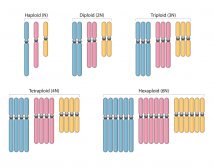Definition
noun
A genetic disorder caused by genetic changes in chromosome 13, such as an extra copy of chromosome 13 (trisomy) or the translocation of a portion of chromosome 13
Supplement
Patau syndrome is one of the various genetic disorders in humans caused by the presence of extra genetic material in the cells of the body. In Patau syndrome, the extra genetic material is an extra copy of the entire or a partial part of the chromosome 13. Chromosome 13 is the chromosome that likely to contain about 300 or less than 400 genes, and with a centromere located near the end (acrocentric). It is an autosome that normally occurs as two copies, i.e. one derived from the mother and the other from the father. There are instances wherein there is an excess of chromosome 13. Chromosomal duplication and nondisjunction during meiosis are possible causes that lead to the having an extra genetic material. Having three copies instead of two is referred to as trisomy. Thus, Patau syndrome is also called trisomy 13. Another possible cause of Patau syndrome is translocation where a portion of the chromosome such as chromosome 13 is misplaced or translocated to another chromosome during embryonic development. Some cases of Patau syndrome are referred to as mosaic-type, where only some cells of the body are affected.
The symptoms of Patau syndrome may vary depending on the severity. Some of the symptoms are intellectual disability, holoprosencephaly, meningomyelocele, heart defects, sloping forehead, microcephaly, structural eye defects, hare lip, low-set ears, polydactyly, rocker-bottom feet, abnormal genitalia, etc.
Patau syndrome is named after the Klaus Patau, a German-born American geneticist, who reported the syndrome and associated it with trisomy in 1960.
Synonym(s):
- trisomy 13
- trisomy D
See also:







